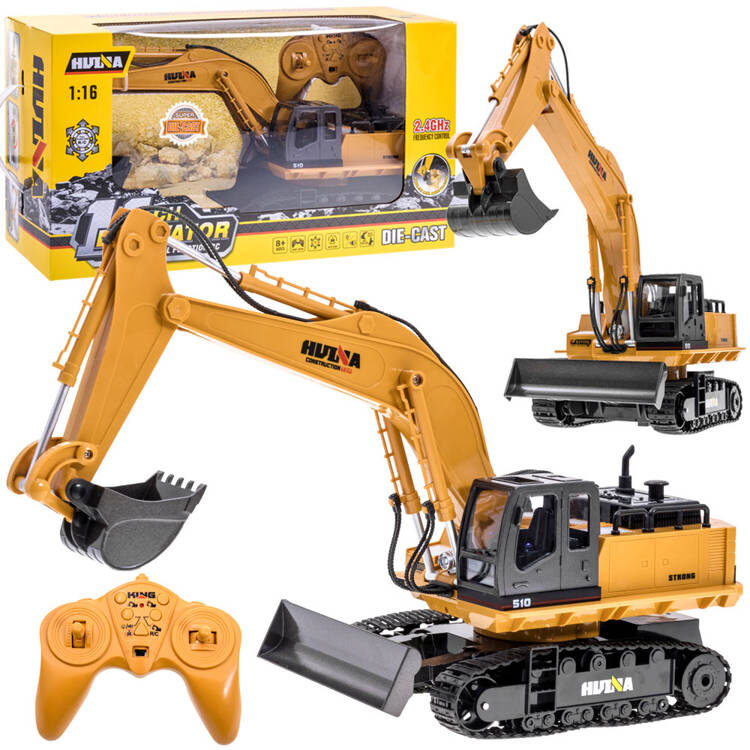5 Reasons Why the Double E Volvo rc excavator Is a Must-Have for Every Construction Team
Recognizing How Excavator Functions and Its Impact on Performance
Excavators play a necessary function in building and construction and mining procedures, relying on a complicated interaction of mechanical and hydraulic systems. Their ability to carry out a range of jobs depends upon both their design and the technology incorporated within. Comprehending these parts can significantly impact functional performance and efficiency. As advancements continue to improve the market, one should take into consideration exactly how these changes will affect future methods and performance.
The Essentials of Excavator Mechanics

The Duty of Hydraulic Solutions in Excavators
At the heart of excavator operation exists the hydraulic system, which plays a crucial function in powering the maker's activities and functions. This system utilizes pressurized hydraulic fluid to move energy, making it possible for numerous actions such as excavating, swinging, and lifting. By using the concepts of hydraulics, excavators can execute tasks with remarkable precision and pressure, enhancing total functional efficiency.The hydraulic system contains key parts, consisting of cyndrical tubes, pumps, and valves, which collaborate to manage the circulation and instructions of the fluid. When the operator involves the controls, the hydraulic fluid is guided to particular cylinders, translating the driver's commands right into physical motion. This system enables for receptive and smooth actions, which are crucial in building and construction and excavation settings. double e volvo rc excavator. The efficiency of the hydraulic system straight affects the efficiency and versatility of the excavator, making it a vital aspect in contemporary excavation processes
Trick Elements of an Excavator
Recognizing the key components of an excavator is necessary for grasping how this effective equipment operates. An excavator includes numerous substantial aspects, consisting of the undercarriage, house, boom, pail, and arm. The undercarriage offers security and flexibility, often including tracks or wheels to browse various terrains. The house has the engine and hydraulic systems, enabling the driver to regulate motion and power the maker. The boom expands from your home, making it possible for vertical reach, while the arm attaches to the container, helping with excavating and training operations.Additionally, the cab houses the driver, outfitted with controls for specific maneuvering. Each of these elements plays a crucial duty in the excavator's overall capability, adding to its performance and efficiency on building sites. Comprehending these parts assists in optimizing and keeping excavator performance, making sure tasks are finished securely and effectively.
Add-on Flexibility and Its Benefits
Accessory flexibility is an important element of excavators, allowing drivers to change between various devices customized for specific tasks. This flexibility not only boosts job effectiveness but additionally contributes to cost-effectiveness by decreasing the demand for several devices. Understanding the various kinds of add-ons available can considerably impact the total efficiency and functionality of an excavator on task websites.
Kinds of Add-ons
While excavators are primarily identified for their digging capacities, their true versatility depends on the large range of attachments readily available. These accessories boost the excavator's performance, allowing it to do various tasks beyond excavation. Common accessories include buckets (for excavating and scooping), hydraulic thumbs (for comprehending products), and augers (for piercing holes) Grapples are made use of for moving and dealing with debris, while rippers can separate difficult surface areas. Various other specialized attachments, such as plates and plows, enable excavators to adjust to specific work demands. This variety not only raises the device's utility across various fields, including demolition, building, and landscape design, however likewise allows drivers to tailor their tools to satisfy specific task needs successfully.
Raised Task Performance
Making the most of task performance is a main benefit of using various excavator attachments. Various accessories permit an excavator to carry out numerous jobs without requiring to change devices, saving beneficial time and labor. Utilizing a hydraulic hammer can damage concrete while a container accessory can dig deep into dirt, enabling a smooth workflow. This flexibility decreases downtime connected with equipment adjustments and improves productivity on-site. Furthermore, specialized attachments enhance accuracy in tasks such as grading or landscape design, resulting in higher high quality end results. The capability to adjust to various job requirements not just streamlines operations however also lessens the requirement for additional machinery, making sure that jobs are finished swiftly and efficiently. Generally, add-on versatility significantly adds to raised task effectiveness in excavation job.
Cost-Effectiveness and Adaptability
Cost-effectiveness is a considerable benefit of utilizing versatile excavator attachments. These accessories enable a single excavator to carry out several jobs, minimizing the demand for additional equipment and labor - double e volvo rc excavator. By switching over in between pails, hammers, and grapples, operators can take on different jobs, from excavating to demolition, thus optimizing tools utilization. This flexibility not only lowers operational expenses however likewise minimizes downtime related to transforming equipment. In addition, the capability to customize excavators with specialized accessories improves productivity, as they can effectively take care of varied tasks according to task demands. In conclusion, the mix of cost-effectiveness and versatility in excavator attachments adds to boosted functional performance and source allocation in building and excavation tasks

Advanced Technology in Modern Excavators
Modern excavators are progressively outfitted with sophisticated innovation that changes excavation procedures. Automation simplifies procedures, while enhanced fuel performance lowers functional costs. Furthermore, wise control systems improve accuracy and safety, marking a substantial evolution in excavation tools.
Automation in Excavation Processes
As excavation modern technology evolves, automation has actually become a crucial part in enhancing performance and accuracy on work sites. Modern excavators are outfitted with innovative automated systems that promote tasks such as grading, excavating, and trenching with marginal operator treatment. These systems use sensors, GPS, and artificial intelligence algorithms address to guarantee exact placing and depth control, greatly lowering the margin for error. Additionally, automation allows drivers to concentrate on critical decision-making as opposed to hands-on controls, causing boosted productivity generally. Such developments not just simplify process however additionally enhance safety by lessening human error in intricate operations. Subsequently, the integration of automation in excavation processes represents a substantial improvement in construction technology, driving the sector in the direction of greater performance and efficiency.
Enhanced Gas Effectiveness
Improvements in modern technology have actually likewise resulted in significant renovations in gas effectiveness for modern excavators. Modern equipments are geared up with advanced engines that optimize power outcome while minimizing fuel intake. These engines utilize innovative burning modern technologies, such as turbocharging and straight fuel injection, to boost efficiency and efficiency. In addition, lightweight materials in building reduce overall weight, permitting for much less power expenditure throughout operation. The introduction of variable speed controls enables operators to change engine efficiency according to particular tasks, additionally minimizing fuel use. Consequently, these improvements not only reduced functional prices but also add to ecological sustainability by decreasing emissions. Generally, boosted fuel performance in excavators is a necessary advancement that boosts efficiency and economic practicality in the construction sector.
Smart Control Solution
While drivers browse significantly complicated work sites, wise control systems in excavators have emerged as important tools for enhancing performance and accuracy. These advanced modern technologies make use of sensing units and formulas to monitor various specifications such as load weight, terrain conditions, and functional efficiency. By automatically readjusting hydraulic features, smart systems enhance maker efficiency, bring about enhanced efficiency and reduced wear on components. Furthermore, operators gain from user-friendly user interfaces that give real-time feedback and diagnostics, permitting for educated decision-making. This integration of technology not only enhances procedures but also lessens human mistake, adding to safer workplace. As the building sector proceeds to develop, smart control systems will certainly play an essential duty fit the future of excavator efficiency and performance.
Enhancing Operational Performance With Excavators
Excavators play an essential role in boosting operational efficiency throughout numerous building and construction and excavation jobs. Their versatility permits multiple tasks, including training, excavating, and material handling, which simplifies process and decreases the requirement for additional devices. With powerful hydraulic systems, excavators can carry out durable jobs with precision, significantly decreasing the time required to total projects. The assimilation of advanced technology, such Read Full Article as general practitioner and automated controls, better maximizes their procedure, enabling drivers to accomplish greater accuracy and reduce material waste. Furthermore, modern-day excavators are made to consume less fuel and minimize emissions, adding to both cost financial savings and environmental sustainability. By making use of excavators efficiently, building and construction teams can enhance efficiency, meet task due dates, and boost total website administration. This multifunctionality and performance make excavators important tools in the modern building and construction landscape.
The Future of Excavators in Building And Construction and Mining Industries
As the building and construction and mining markets develop, the future of excavators is poised for substantial transformation driven by technical advancement and transforming functional needs. Breakthroughs in automation and expert system are reshaping excavator abilities, allowing for improved accuracy and effectiveness in operations. Autonomous excavators are arising, decreasing the requirement for human treatment and lessening the danger of accidents.Moreover, the assimilation of telematics and IoT modern technology enables real-time tracking of machine efficiency and predictive upkeep, enhancing uptime. Environment-friendly layouts, consisting of electric and hybrid designs, are acquiring traction, straightening with sustainability goals within the industry.Additionally, using sophisticated products and lighter layouts enhances fuel effectiveness while maintaining performance requirements. As these trends development, excavators will play a crucial function in fulfilling the boosting needs for productivity and safety and security in construction and mining, ultimately transforming operational landscapes.
Frequently Asked Concerns
Just How Do Weather Influence Excavator Efficiency?

Climate problems considerably influence excavator performance, as rain and mud can prevent grip and security, while extreme temperature levels may influence hydraulic systems. Operators needs to adjust to these variables to assure ideal functionality and security throughout procedures.
What Security Steps Should Operators Adhere To While Using Excavators?
Safety actions for excavator operators consist of putting on proper personal protective equipment, performing pre-operation assessments, making sure proper communication with ground workers, maintaining a risk-free distance from overhanging risks, and adhering to recognized operational methods to avoid crashes.
How Frequently Should Excavators Be Kept for Optimal Performance?
Excavators ought to be kept consistently to ensure peak performance, usually every 250 operating hours or as specified by the producer. Routine checks boost dependability, prevent unforeseen breakdowns, and expand the lifespan of the devices.
What Is the Ordinary Lifespan of an Excavator?
The average lifespan of an excavator generally varies from 10,000 to 15,000 hours of operation. Factors affecting long life consist of maintenance methods, running problems, and the high quality of the equipment itself, influencing general performance and effectiveness.

Can Excavators Operate Irregular Surface Successfully?
Excavators can run properly on uneven surface due to their articulated styles and flexible tracks. These attributes enable them to maintain security and grip, making it possible for reliable procedure in difficult environments generally run into in building and construction and landscape design tasks. Each of these elements plays an essential role in the excavator's overall performance, contributing to its performance and efficiency on building and construction websites. Making the most of work efficiency is a main benefit of utilizing different excavator attachments. While operators browse increasingly complex work websites, smart control systems in excavators have emerged as essential tools for improving efficiency and accuracy. Excavators play a crucial role in boosting functional efficiency across look at this site various building and construction and excavation projects. Advancements in automation and artificial knowledge are reshaping excavator capacities, allowing for enhanced accuracy and performance in procedures.